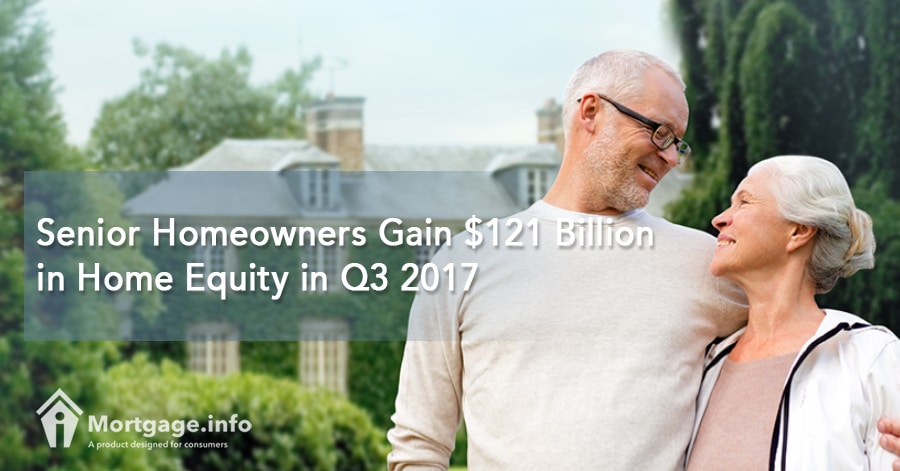As 2017 is drawing to a close, homeowners aged 62 and above may be able to draw more from their home equity. They were $121 billion in home equity richer during the third quarter of 2017 per Reverse Mortgage Market Index (RMMI) by the National Reverse Mortgage Lenders Association and RiskSpan.
This senior home equity wealth is tappable a number of ways, including reverse mortgages.
Senior Home Equity Reached $6.5 Trillion
Last third quarter, home equity among older homeowners grew 1.9% to $6.5 trillion based on the report.
The quarterly gain arose from home values appreciating at a rate of 1.7% — that’s $137 billion minus mortgage debt held by senior borrowers increasing by $15.9 billion, the report noted.
During the second quarter of 2017, the Index reached 233.8 pts. — an all-time high record since its publication seven years ago.
“Reliable Source of Economic Security”
NRMLA President and CEO Peter Bell recognized in a public statement that Americans in their retirement age continue to rely on their home equity as a “reliable source of economic security”.
Being 62 and above, for instance, makes homeowners eligible for reverse mortgages. These senior homeowners have either substantially paid down their mortgages or hold substantial equity.
Majority of these loans are backed by FHA formally called Home Equity Conversion Mortgages (read as HEK-UM).
Under HECMs, senior borrowers can borrow against their home equity and convert it into a line of credit. This helps them pay off medical expenses, make home repairs and cover periodic expenses.
For large purchases including buying a home, proceeds from HECM can be received upfront via lump sum. This single disbursement lump sum payment option is available with fixed-rate HECMs only.
Effective 2018, HECMs have higher loan limits, thereby increasing the maximum amount borrowers can draw from their loans. The actual amount still depends on the age of the youngest borrower and the value of the home (vis-a-vis the HECM’s maximum loan limit and the home’s sales price).
Preserving Home Equity for Seniors
While they have been known as an important income for older homeowners in their retirement, as noted above, these mortgages have been criticized for depleting homeowners’ equity when they delay that very retirement.
This and other circumstances have prompted FHA to improve the program to preserve equity for senior homeowners.
These two key enhancements to the HECM program effective October 2017 are:
- The principal limit factor or the maximum amount a senior borrower can borrow is lowered to 58% of the home’s equity. This PLF increases with age but decreases with the interest rate as it goes up.
- The annual insurance premium has been lowered to 0.5% to slow down charges against equity. To offset this decrease, the upfront mortgage insurance premium has been set to 2% across all borrowers.
Because HECMs work in reverse, they become due and payable when the borrower moves out, sells the property or passes on. But, default can still happen on reverse mortgages when the borrower fails to pay property taxes and homeowners insurance premiums.
Reverse mortgages can be complicated to understand. That’s why counseling is required for would-be borrowers of the program. To find out more about HECMs, speak with an expert.

